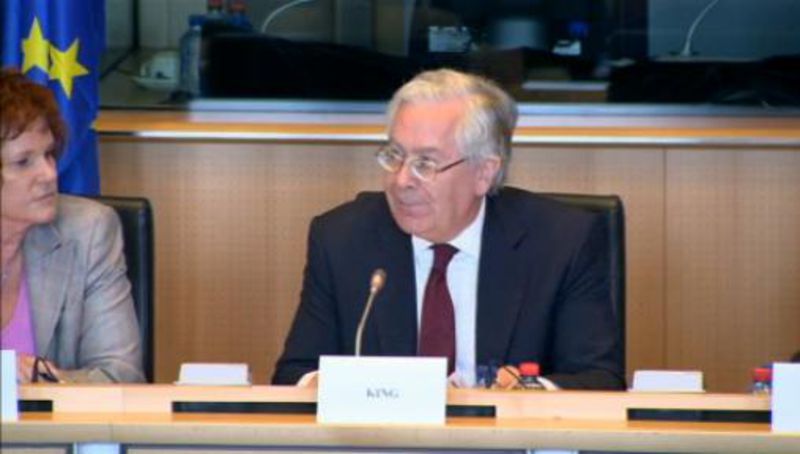Elena Salgado: No country will present a stupid budget
Adelina Marini, April 19, 2010
 On the second day of their informal meeting EU finance ministers discussed the new measures the European institutions propose to introduce to avoid a repetition of the Greek crisis in the future. The main problem however, is the legal framework which is supposed to grant the European Commission authority to review the national budgets of eurozone countries before they are submitted to national Parliaments for approval.
On the second day of their informal meeting EU finance ministers discussed the new measures the European institutions propose to introduce to avoid a repetition of the Greek crisis in the future. The main problem however, is the legal framework which is supposed to grant the European Commission authority to review the national budgets of eurozone countries before they are submitted to national Parliaments for approval.
The idea is the budgets of the euro area member states to be peer reviewed by the Commission and the Eurogroup in order to avoid measures that might endanger the rest of the eurozone and to get them corrected in time. And as the time from the moment of the preparation of a national budget until its submission to the national parliament is short, the Economic and Monetary Affairs Commissioner Olli Rehn proposes the introduction of a European Economic Semester.
From January until July all member states will have to provide their budgetary lines for the next year so that they can be peer reviewed by the Commission and the Ecofin. The European Economic Semester will give opportunities for recommendations for immediate actions when necessary.
Olli Rehn, the president of the Eurogroup Jean-Claude Juncker and the president of the European Central Bank Jean-Claude Trichet agreed that this measure was more than imperative. It was supported by the Spanish minister of finance Elena Salgado too, whose country aside from presiding the EU rotating Presidency is also in a dire financial situation (with enormous public debt and growing budgetary deficit).
She added that currently all nations were in an entirely new situation because in the very beginning of the creation of the Stability and Growth Pact a few member states were in an excessive deficit procedure, while currently almost all members were. "So, something must be done in order to improve competitiveness. All this is part of the same problem", Ms Salgado added.
She excluded the possibility a veto to be imposed over national budgets if it is assessed that a budget is not in line with the recommendations and eurozone's common interests. Elena Salgado, however, was not very convincing in her explanations: "No country will present a weird budget, so such an action will not be necessary. Simply, there is no country that will present a stupid budget". After all, the idea of a budgetary peer review was debated by EU's finance ministers for the first time, so it is natural that it has not yet fully crystallized. On May 12 Olli Rehn will present the entire proposal of the Commission which will then be again discussed in Ecofin and after that - by the European Council.
Another very important issue the European finance ministers discussed on Saturday was the preparation of EU's participation in the G20 summit in Toronto in June. Three are the main priorities on which the Union will focus at the summit:
The first one is to ensure that the summit in the Canadian city will end with an overall exit strategy as agreed in Pittsburgh in order to diminish the risk of crisis spill-over. According to Commissioner Olli Rehn, "the risks of a later exist are not less significant than an early exit, therefore coordination on a global level is needed".
The second priority would be all major regions around the world to play their role in solving macroeconomic imbalances.
And thirdly, to seize the momentum for financial reform by avoiding non-coordinated approaches. The EU is cautious with regard to the idea of imposing taxes on global financial transactions. According to the ECB's president Jean-Claude Trichet, sequencing is necessary, if this idea is to be realised in order to prevent harming the emerging economic growth. "The main message of the ECB is to avoid protectionism, financial mercantilism - we are in Europe and we have to protect the single market", Trichet added.
In the last day of the Madrid meeting the Asian ministers of finance joined the discussions. The absence of the representatives of Russia, China and Japan was evident. The main purpose of the EU-Asia meeting was to discuss exit strategies and financial reform.
 | © European Union
| © European Union | © European Union
| © European Union | © European Union
| © European Union Angela Merkel, Emmanuel Macron | © Council of the EU
Angela Merkel, Emmanuel Macron | © Council of the EU Benoit Coeure | © Council of the EU
Benoit Coeure | © Council of the EU Pierre Moscovici | © Council of the EU
Pierre Moscovici | © Council of the EU